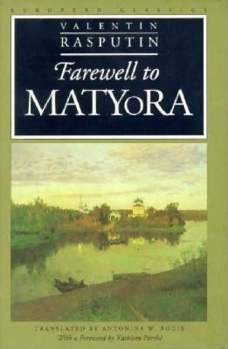Proscanie s Materoj
Select Format
Select Condition 
Book Overview
A fine example of Village Prose from the post-Stalin era, Farewell to Matyora decries the loss of the Russian peasant culture to the impersonal, soulless march of progress. It is the final summer of the peasant village of Matyora. A dam will be completed in the fall, destroying the village. Although their departure is inevitable, the characters over when, and even whether, they should leave. A haunting story with a heartfelt theme, Farewell to Matyora is a passionate plea for humanity and an eloquent cry for a return to an organic life.
Format:Paperback
Language:English
ISBN:0810113295
ISBN13:9780810113299
Release Date:September 1995
Publisher:Northwestern University Press
Length:227 Pages
Weight:0.67 lbs.
Dimensions:0.8" x 5.1" x 7.7"












